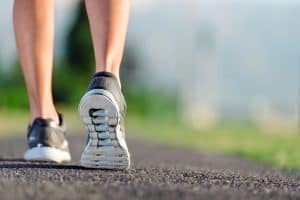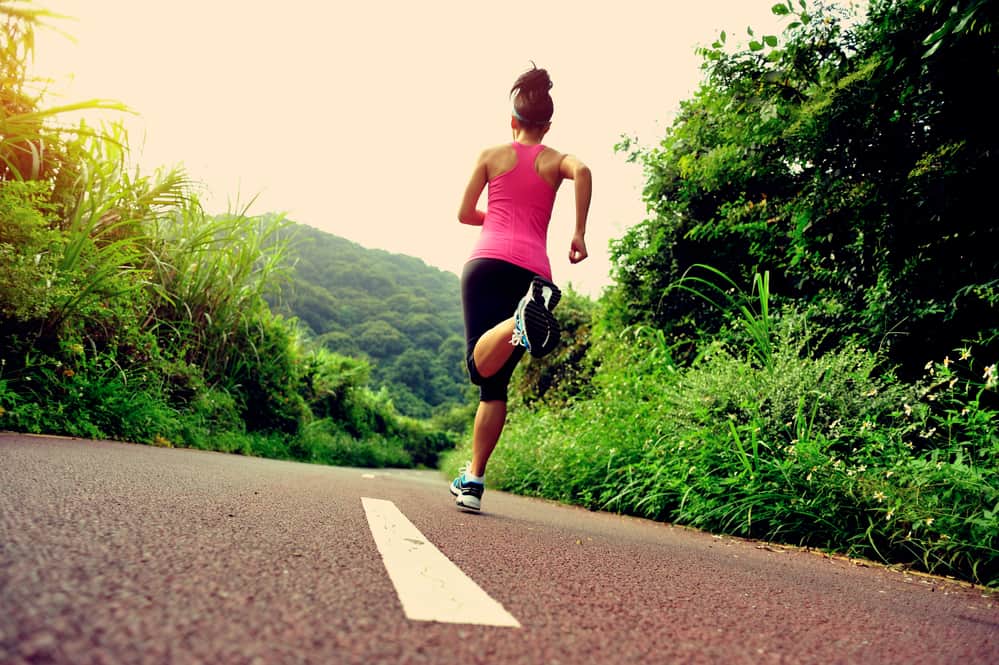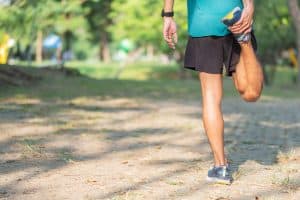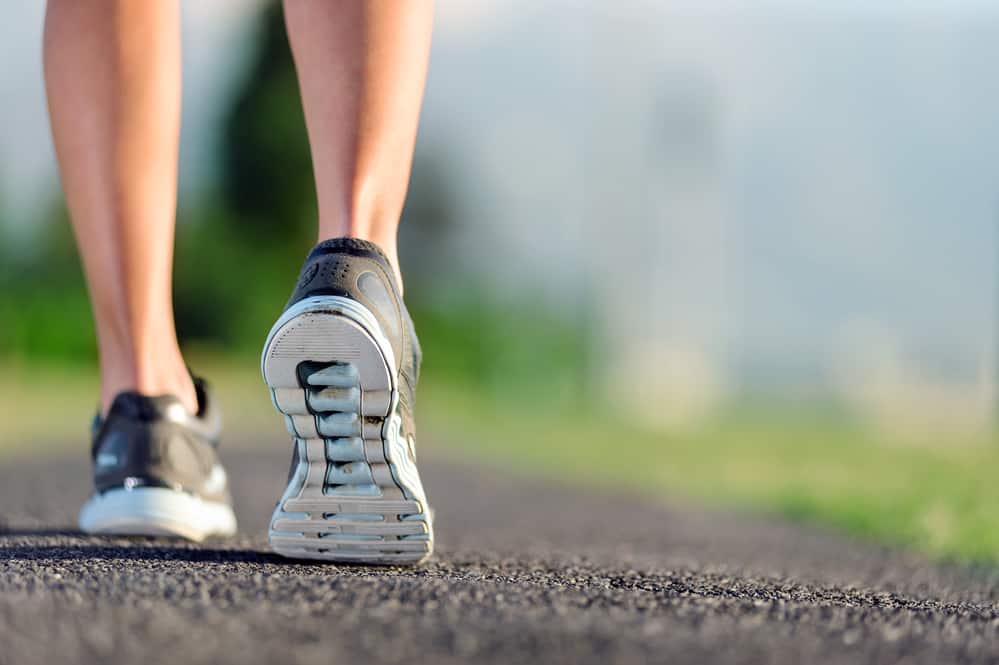Why do your legs feel heavy running? The possibilities are endless!
You could be overdoing strength training or not doing it enough. Or, maybe you’re not consuming enough carbs. Or protein? Maybe you’re skipping your stretches. That’s a legit cause, isn’t it?
Although the possible causes are a lot, each cause has distinctive symptoms. So, it’s not too hard to know what’s causing the heavy feeling in your legs.
Here are all the possible reasons why your legs feel heavy running!

You’re Overusing Your Muscles
Most injuries you develop while running are overuse injuries. These are the easiest to sustain and the hardest to recover because they signify that your muscles need a break.
Many runners tend to overexercise when they have a marathon or a race coming up. What they don’t know is that they could develop an overuse injury that’ll prevent them from participating in the race.
You may overuse your muscles by increasing your mileage suddenly, going on extra long runs, or increasing your training volume without changing your lifestyle to match it.
If your legs feel heavy and stiff during a long run, it may be a sign you need to take a break. Overuse injuries will usually be accompanied by overall fatigue and low performance, and you may notice that running feels much harder than usual. These are all signs that you should cut back on your running sessions and take a break.
You’re Not Stretching
If you finish your run and jump into the shower immediately, you’re missing the most important step of your workout session. Stretching after running isn’t a luxury; it’s necessary if you don’t want your muscles to fill stiff and heavy afterward.
If you miss stretching, there’s a high chance your legs will feel heavy running the next day. That’s because you didn’t let the muscles relax and recover properly.
Stretching doesn’t need to take a lot of time. You can finish your stretches in under 10 minutes if you know what you’re doing. Plus, it’ll be fun and relaxing if you have a foam roller.
When stretching, don’t forget to target the muscles that get engaged the most while running. Those include the hamstrings, glutes, quads, and hips.
You’re Not Running Correctly
Running seems easy, and anyone can do it. But contrary to common belief, not a lot of people can run correctly. Maintaining a correct posture while running is essential for your well-being. If your legs feel too heavy running, and there isn’t any logical cause, you may simply be running incorrectly.
Running in the wrong form can put more stress on your muscles and spinal cord, causing a heavy feeling in your calves.
To run right, you need your ground contact time and vertical oscillation to be low. If your legs stay on the ground too long, they’ll slow you down. Likewise, if you keep bouncing higher than necessary, you’re putting repetitive stress on your shin and ankles. That’s prone to causing a heavy feeling if you do it long enough.
You’re Overdoing Strength Training
Many runners incorporate strength training into their daily schedules to build their muscle mass. Strength training is indeed essential. It allows runners to balance their bodies while running, and it helps them run faster by building their calf muscles.
However, overdoing it may put unnecessary stress on your ligaments and bones. If your leg muscles feel heavy amid your run, there’s a high chance you’re doing more strength workouts than necessary.
As a rule of thumb, when you’re in the race season and training a lot, it’s better to limit your strength workouts to only twice a week.
On the other hand, you can train every other day during the off-season, as long as you’re not overdoing it.
You’re Not Doing Enough Strength Training
If you don’t already know this, running doesn’t only burn calories and break fats. It also breaks down muscles, although not in major percentages.
Still, the minor muscle loss may cause adverse effects if not compensated by strength training. If you’re doing too little strength training, you may be prone to muscle breakdown, which may be the reason you have a heavy feeling in your legs while running.
To avoid this, you need to be fueling properly before running by having energy drinks and eating enough amounts of carbs and protein. That way, your body won’t have to burn the protein in your muscles for fuel.
Additionally, you’ll need to include strength workouts in your weekly training plan so you form enough muscles to alleviate the heavy feeling in your legs.

You’re Wearing Bad Shoes
Can you imagine Cristiano Ronaldo scoring even half of his current goal count wearing a pair of bad shoes? Or Usain Bolt managing to break one record after another if his shoes aren’t comfortable enough?
The answer is no. For any runner or athlete, the shoe can make or break the run. If you’re wearing bad or cheap shoes, they might as well be causing the heavy feeling in your legs. You’ll know that that’s the cause if the pain is extending to your feet soles and ankle bones.
Try to choose lightweight shoes because bulky ones are more prone to causing pain. Also, choose a pair of shoes with a flexible or semi-rigid sole, and preferably a soft upper. If you want the extra protection, you can get a pair of high-ankle shoes.
You’re Not Consuming Enough Carbs
It’s true that carbs are the first to go in any weight loss diet, but the lack of carbs isn’t good for runners. When you run or do any cardio workout for that matter, your body starts using up the carbs stored in your muscles for energy.
If you’re not consuming enough carbohydrates, your body won’t find enough glycogen to break into energy, and you’ll feel your muscles become stiff the more you run.
Try to keep your diet balanced with sufficient amounts of protein, healthy fats, and carbohydrates. Don’t cut back on one of them because it’ll show its effects on your body.
Alternatively, you may try a ketogenic diet. These diets are designed to cut carbohydrates intake yet provide enough energy.
You’re Not Eating Healthy
If you’re not training too hard or overusing your muscles, the reason for the heavy feeling may be your daily eating habits.
If you’re recently eating more calorie-dense meals or maybe consuming too much sugar, the calorie gain may be the cause behind your heavy muscles.
You may also be eating larger portions than usual. That’s especially true for females when their estrogen levels drop and they feel more hungry.
If that’s the case, monitor your portions and make sure to include a lot of fibers in your diet, and lay low on calorie-dense meals. Opt for 80% of your meals to be healthy, leaving the rest for some indulgences.
You Don’t Drink Enough Water
If the heavy feeling in your legs feels more like a cramp, there’s a high chance it’s a result of dehydration. If you don’t drink enough water, your body can’t compensate for the amount of lost fluid through sweat. As a result, your blood volume will be thicker, causing your body to work harder to pump it.
Accompanied with the overall fatigue, this may cause your leg muscles to feel heavy.
To prevent that, make sure to drink frequently, even if you’re not thirsty. You may also get a hydration pack and wear it while running. That way, you have access to water during your session.
Additionally, you may opt for a drink that has electrolytes after a heavy training session. Water may not be enough to give your body what it needs then.

You Have Anemia
Anemia, or iron deficiency, is one of the most common blood disorders in the US. Apparently, more than three million Americans suffer from it, and you may be one of them if you constantly have a heavy feeling in your muscles while running.
Iron deficiency hinders your body’s ability to deliver oxygen to the muscles. So, when you keep exercising, the supply of oxygen isn’t enough, and your muscles start feeling heavy after a while. Plus, you’ll feel fatigued all over your body.
If you’re vegan or vegetarian, you may want to pay extra attention to this issue since most of these diets lack sufficient iron intake. It’s virtually impossible to give your body enough iron on a vegetarian diet, so you may need to take some supplements or work on improving your iron absorption.
One last thing: females are more prone to having iron deficiency issues because of menstrual bleeding. So, before adopting a harsh training routine, you may want to carry out screening and know for sure whether you have low hemoglobin levels.
You Have Poor Circulation
People with naturally poor circulation often feel heavy legs while running because the blood pools in the legs without flowing back up fast enough.
Naturally, the blood should circulate around the body and return from the lower limbs to the heart. When you have bad circulation, the valves in your veins may work against gravity and prevent the blood from flowing back up, especially if you keep contracting your muscles as you run.
Poor circulation is often a result of chronic venous insufficiency, and it’s a pretty common condition. The good news is that most people can overcome it with regular exercise.
You can’t possibly know if the heavy feeling you get is a result of poor circulation unless a doctor diagnoses it.
How to Prevent Heavy Legs While Running
If the heavy feeling is getting annoying and persistent, there are some ways to overcome it. Here are a couple of tips to follow to get those light, agile legs back!
Use a Foam Roller
Foam rolling can go a long way in helping your muscles recover from long runs. It also improves blood circulation, which may help if the heavy feeling you get is a result of poor circulation.
A foam roller will also cause your muscles to loosen up, improving the recovery for your next run. If you don’t have one, it may be time to buy it and incorporate it into your warm-ups and cooldowns.
Don’t Forget to Cool Down
If your legs feel heavy after running, it may be because you don’t stretch them well enough. The muscles will be stiff and sore then, and they need to be stretched for recovery. Not to mention, you need to bring your heart rate down.
As a rule of thumb, try to cool down for ten minutes after running, and maybe more if the session has been tough or long.

Don’t Miss Your Warm-Ups
If you don’t already have a solid warming-up schedule, it may be a good time to do it. Running without warming up can have a toll on your muscles and affect your ability to complete the workout session.
To warm-up, you need to do both stretching and jogging. When stretching, target all the muscles included in running, including hams, quads, and glutes. Meanwhile, for the jogging, only five minutes or so will do.
What’s important is to create a schedule and abide by it.
Choose the Right Pair of Shoes
More often than not, the heavy feeling you get is because of your shoes—particularly if the pain is concentrated in the shins or low calves.
The solution to that is choosing a solid pair of shoes that’ll withstand your tough workout sessions.
Aim for durability and flexibility. Get a pair with soft uppers and a semi-rigid sole for the best results. Additionally, replace your shoes every six months when they wear out.
The Verdict On Why Your Legs Feel Heavy Running
If your legs feel heavy running, there may be multiple reasons for it. For one, you may be overdoing your strength training or missing your stretches. You may also be wearing a pair of bad shoes, or you may be simply born with poor circulation.
In all cases, it’s nothing a warming up session or a good old foam roller can’t fix!

